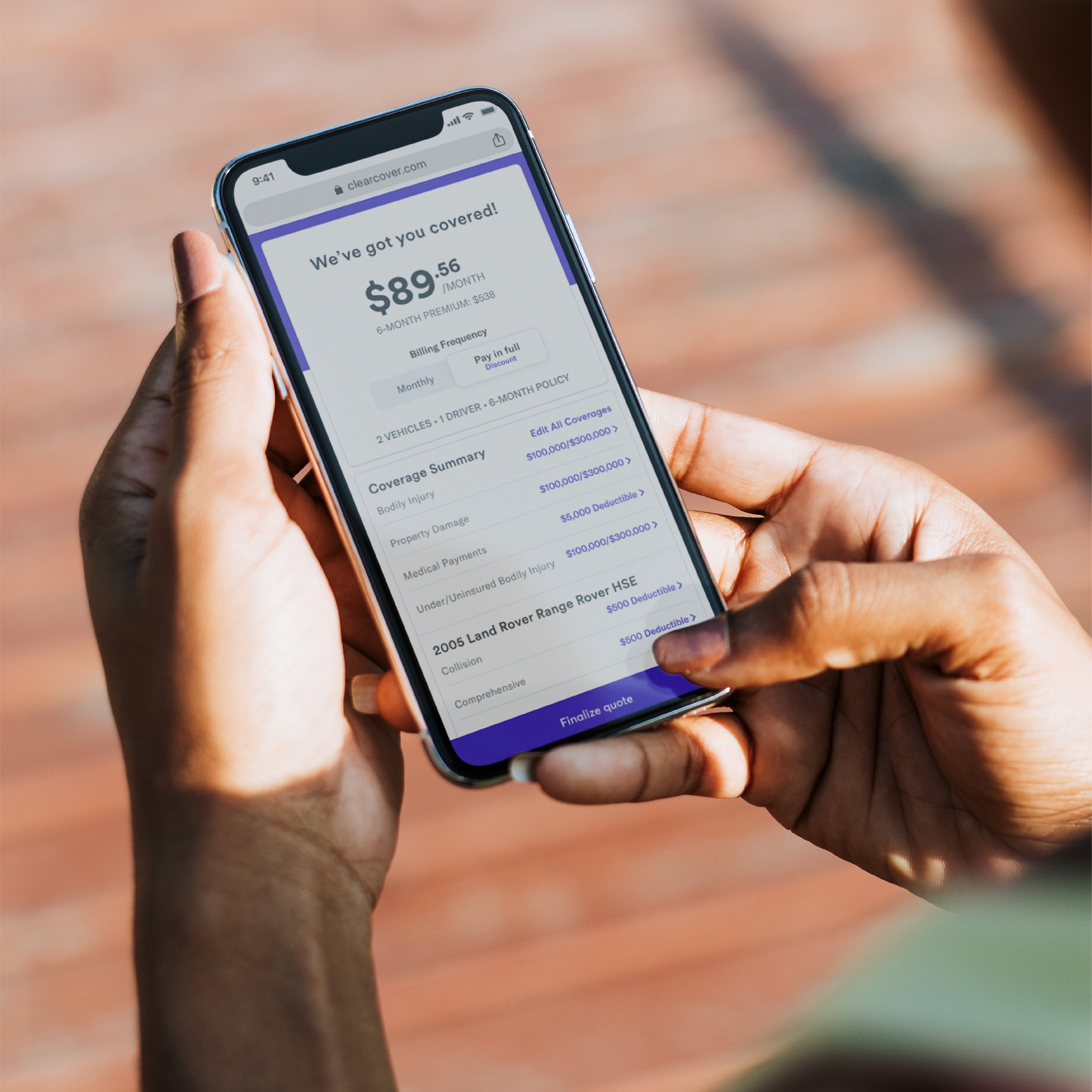What Does It Mean to Let Your Insurance Lapse?
Written by Team Clearcover
A car insurance lapse refers to a period of time when you go without auto insurance coverage. A car insurance lapse can happen for various reasons, such as unpaid premiums, cancellation by the insurer due to too many tickets or accidents, or a policy expiring without being renewed.
A lapse in car insurance coverage can be costly, no matter the cause. In this article, you'll gain an understanding of:
The impact a lapse can have on your insurance premiums
The consequences of being caught without insurance
What to do after a lapse (and how to prevent it from happening again)
Grace periods and other lapse-related timeframes
Will My Auto Insurance Rates Increase After a Lapse in Coverage?
In many cases, an insurance lapse can significantly impact your car insurance premiums. However, there are a few exceptions.
For example, if you only go a few days without coverage, or if you can provide an explanation the insurer finds adequate, they may not raise your rates at all. However, if you let your policy lapse for an extended period, you are more likely to see a rate increase when you obtain a new policy.
If you're looking for insurance after a lapse in coverage, remember that every insurance company is different. Some companies view a lapse in coverage as a more significant concern than others.
Any increase in premiums you may experience from a lapse in coverage will typically be seen immediately following the lapse. Once you've had coverage reinstated and can provide proof of continuous insurance, you may be able to get a better rate at renewal or by changing insurance providers.
A lapse in coverage affects more than just the cost of your insurance. Many vehicle finance agreements require a specific level of insurance coverage to be in place until you've paid off the auto loan. Failing to keep adequate coverage can allow the finance company to repossess your vehicle. A lapse in coverage can also make it harder to get car insurance in the future. If you’re in an accident while uninsured, you could also face potential financial and legal repercussions. Even if you don't get into an accident, being caught driving while uninsured can result in fines, a loss of your license, and even jail time.
What to Do After an Insurance Lapse
If your auto insurance policy has lapsed, it's important to take action right away. There are a few things you can do to get back on track and potentially mitigate some of the consequences:
1. Call Your Insurer
The first thing you should do if your auto insurance policy lapses is call your insurer and explain the situation. They may be willing to work with you to get coverage reinstated. If the lapse was due to non-payment, you'd likely need to get your premiums up to date before coverage can resume. They may also have suggestions to help you avoid a lapse in the future.
2. Shop Around for Insurance Providers
It's a good idea to shop around for a new insurance provider if you've had a lapse in coverage. While it can be tricky to obtain coverage after a lapse, don't get discouraged if the first company you get a quote from cannot issue coverage at a reasonable rate. Some carriers are not comfortable insuring people who have gaps in coverage, while others may not place as much emphasis on the lapse.
3. Do Not Drive Until You Have Coverage
This one might be the most important: don't drive until you have car insurance. If you're caught driving without coverage, you could face significant fines, penalties, or even jail time. On top of that, being in an accident while uninsured can result in financial consequences and legal repercussions that could create difficulties for years to come.
4. Get Coverage ASAP
The best way to minimize the consequences of a lapse is to get insured as soon as possible. This will help ensure that you meet state insurance requirements and will keep you covered in the event of an accident. The sooner you get coverage, the better.
How to Avoid a Lapse in Auto Coverage
Now that you know how serious a lapse can be, here are a few things you can do to proactively avoid a lapse in the coverage in the first place.
1. Make Sure Your Payments Arrive on Time
First and foremost, keep your insurance payment current. Consider opting into automatic payments, and always keep your credit card information up to date with your insurance company. Payment options will vary from one insurance company to the next, but you will typically have the option to schedule your payments to be pulled from the account of your choice, and sometimes even on the date of your choice.
If you want to take advantage of pay-in-full discounts, consider paying funds in advance to make sure you have enough on hand to pay your full policy premium when it comes time for renewal.
If you think that making an upcoming payment may be a struggle for you, contact your insurer ahead of time. It is much easier to address payment issues proactively rather than reactively.
2. Be a Safe Driver
Insurance companies have the ability to terminate coverage if the driver they’re insuring poses too great of a risk due to tickets, accidents, or other conduct they may deem troublesome. This means that you can help prevent your coverage from being canceled by being a safe driver. Keep your policy in place by obeying traffic laws, not driving under the influence of drugs or alcohol, and avoiding accidents. For more safe driving tips, read our article, 5 Important Safe Driving Tips here.
3. Get Coverage You Can Afford
Some people may let their coverage lapse simply because they cannot afford it. In this case, you may want to consider getting a less expensive policy with fewer coverages, or switch to a new insurance company that offers more affordable rates.
It's important to compare both rates and coverage before making a change, as some insurers may appear to offer lower rates than others, but will also be offering less coverage. Getting a few quotes and comparing coverages can help you ensure you're getting the best value for your money.
4. Consider Coverage When You Don’t Have a Vehicle
Plenty of situations can arise that leave you without a vehicle for a period of time. Maybe you're taking an extended trip overseas, or you know you’ll be going a few weeks between vehicles—it may seem like a good idea to cancel coverage altogether during these times, but that might not always be the case.
Non-owner insurance can allow you to keep an auto insurance policy active under your name, even when you don't own a vehicle. Non-owner insurance usually provides liability coverage for rental cars and borrowed vehicles. Since you are maintaining coverage, you won't have to face the hassle of a lapse when you need to insure a vehicle again in the future.
How Long Does an Insurance Lapse Stay On Your Record?
Insurance reports typically look back 3-5 years. They allow insurance companies and representatives to check your driving record as a way to evaluate your risk and determine your eligibility for coverage. Insurance reports look at a variety of factors, such as accident history, speeding tickets, and your insurance history, which will include claims and whether or not you've maintained consistent coverage.
The length of time that an insurance lapse will affect your insurance premium varies, but will take place when you obtain new coverage.
The most significant premium increase will occur in the first six months after obtaining a new policy. Typically, once you've been insured for an entire policy period, the financial impact of the lapse will lessen significantly.
What Is a Car Insurance Lapse Grace Period?
Many insurance companies will offer a grace period after a payment is missed. A grace period is a period of time that allows you the opportunity to get caught up with your payment schedule before your coverage lapses. The length of this grace period will vary from one company to the next, but will generally range from 10-20 days. After the grace period has passed, if you have not caught up with your payment schedule, your policy will lapse, leaving you without insurance coverage.
Avoid a Lapse in Coverage and Get Coverage with Clearcover
A lapse in auto insurance coverage can lead to increased premiums, make it difficult to obtain insurance in the future, and leave you without insurance if an accident were to happen.
You can do several things to help prevent a lapse, like making timely payments, being a safe driver, and getting coverage you can afford.
At Clearcover, we understand that life happens. If you're dealing with a lapse in coverage or unaffordable premiums, take control of your coverage and get a free, no-obligation quote with us to discover affordable rates and a variety of coverage options.




